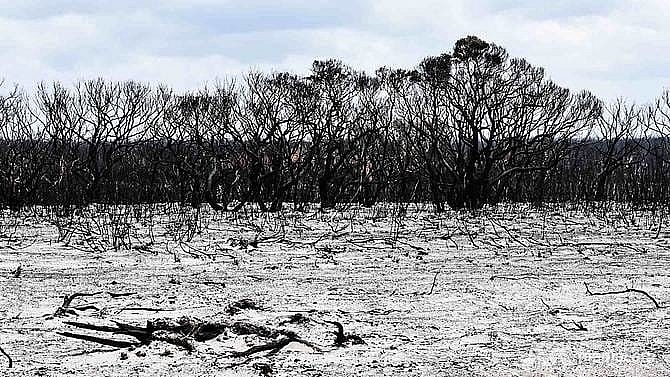Climate change factors should be included on death certificates to show relation between environment and health: Experts
 |
| Australia suffered the worst bushfire season in recent memory in early 2020, following long periods of drought and intense heat (Photo: Jack Board) |
Research from doctors at the Australian National University (ANU) shows that there are major knowledge gaps when it comes to the influence of extreme weather on death and hospitalisation.
Heat mortality, for example, is vastly underreported in Australia, their analysis found, and will increasingly be a major factor on regional health, as the planet continues to warm at an unprecedented rate.
“Recognising these environmental factors in our health and wellbeing is so tremendously important, said Dr Arnagretta Hunter from the ANU College of Health and Medicine when interviewed by CNA.
She is the co-author of a commentary regarding this issue, which was published in The Lancet Planetary Health on Thursday (May 21).
“What we know from climate science is that extreme weather events are occurring with increasing frequency. If we recognise the association between an extreme weather event and adverse health outcomes, we might take the frequency of those weather events more seriously.
“The analysis we’ve done shows that with increasing extreme temperature, we see a mortality influence which is quite significant,” she said.
Death certificates are just one mechanism to collect public health data, which can help governments set funding and health research priorities.
While climate change factors are not normally the primary cause of death, they can contribute in significant ways, and that data should be collected, Dr Hunter said.
“We have the option of mentioning associated influencing factors, such as exposure to smoke or heat. All of those things influence why that person may have been in hospital or sick at that moment in time,” she said.
She added: “When a grandparent falls and fractures the hip and the cause of death is related to the fall, often we can reflect that the really extreme heat that we’d had in the month or two beforehand had influenced the health and wellbeing of that person".
While the research focuses on Australia, following a summer of record temperatures and the worst bushfire season in memory, the applications for updated and more detailed death certificates are global, she said.
Over the coming decades, that information could prove vital to help mitigate the worsening impacts of climate change, and help extend peoples’ life expectancy.
A recent study found that a substantial part of humanity will be forced to endure temperatures warmer than anywhere on the planet today.
Southeast Asia is highly vulnerable to extreme weather. Average temperatures have increased every decade since the 1960s and carbon emissions have increased at some of the fastest rates in the world.
“There are really significant increases in heat with climate modelling over the next 10 or 20 years. It will be a significant issue across the Asia Pacific, in Indonesia, for example, and likely further north than that. This discussion has global resonance,” Dr Hunter said.
“People ask me what temperature is too hot for human health. The answer is, we don’t know.”
What the stars mean:
★ Poor ★ ★ Promising ★★★ Good ★★★★ Very good ★★★★★ Exceptional
Related Contents
Latest News
More News
- IP alterations shape asset strategies for local investors (January 22, 2026 | 10:00)
- 14th National Party Congress: Vietnam - positive factor for peace, sustainable development (January 22, 2026 | 09:46)
- Japanese legislator confident in CPV's role in advancing Vietnam’s growth (January 22, 2026 | 09:30)
- 14th National Party Congress: France-based scholar singles out institutional reform as key breakthrough (January 21, 2026 | 09:59)
- 14th National Party Congress: Promoting OV's role in driving sustainable development (January 20, 2026 | 09:31)
- 14th National Party Congress affirms Party’s leadership role, Vietnam’s right to self-determined development (January 20, 2026 | 09:27)
- Direction ahead for low-carbon development finance in Vietnam (January 14, 2026 | 09:58)
- Vietnam opens arms wide to talent with high-tech nous (December 23, 2025 | 09:00)
- Why global standards matter in digital world (December 18, 2025 | 15:42)
- Opportunities reshaped by disciplined capital aspects (December 08, 2025 | 10:05)

 Tag:
Tag:



















 Mobile Version
Mobile Version